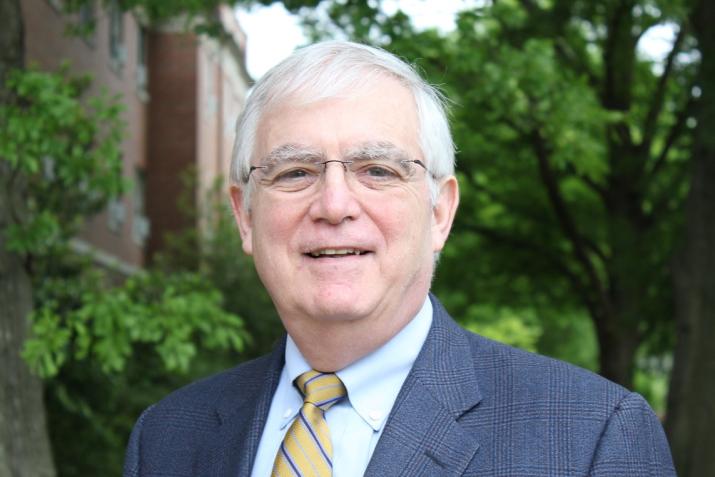
Outgoing DGHI director Michael Merson
Published June 26, 2017, last updated on April 21, 2020
On June 30, founding director of the Duke Global Health Institute (DGHI), Michael Merson, will step down as DGHI director. We sat down with him recently to get his thoughts on five big questions. Here’s what he had to say.
DGHI: What’s your best memory as the director of DGHI?
Merson: DGHI’s fifth anniversary was a particularly special time for the Institute for a few reasons. First, it was our first major milestone. At that point, we were in the process of writing our second five-year plan, we’d recruited more than 30 faculty members, we’d launched several educational programs, we’d formed a number of priority partnerships across the world, and we’d established our Board of Advisors.
DGHI was coming together, and everyone who was involved in the Institute had become very optimistic about its future. We held a symposium to mark the five-year milestone, with presentations by many of our faculty of their research and educational programs.
Our fifth anniversary was even more memorable because we had a contract with ABC News in which we helped them produce global health-related stories throughout the year. Near the end of our contract, they produced a wonderful video that highlighted a few of our projects. Barbara Walters even made an appearance at the end of the video, in which she thanked DGHI for the collaboration—it was very touching.
DGHI: What do you consider to be your most significant legacy from your time as DGHI director?
Merson: The fact that we have helped to recruit more than 60 global health faculty across Duke will be a legacy that will last for decades. DGHI has become a go-to university for faculty in global health in this country, and most of the faculty members we’ve recruited have stayed with us, so we’re building a sustainable future for the Institute. They have been essential to building our global health undergraduate, master’s and doctoral programs.
I think Duke and DGHI have created a sense of vibrancy, growth, opportunity and innovation that attracts faculty. What’s unique about Duke is that global health is an institution-wide priority, and no matter where your academic expertise lies—from medicine to policy to engineering to anthropology—chances are that there’s a way you can connect your work with global health.
At DGHI, we’ve worked to develop a culture of collaboration in which our faculty seek out others with an exceptionally broad range of skills, knowledge and experiences with a common mission to reduce health care disparities locally and globally. I think this is very appealing to prospective faculty.
DGHI: What’s your greatest inspiration for your work in global health?
Merson: People’s career paths are often shaped by their experiences in young adulthood, and that was certainly true for me. While I was medical school in the 1960s, I had witnessed terrible health disparities during my training at King’s County Hospital, which was in a very impoverished area of Brooklyn.
But those disparities paled in comparison to what I saw when I went to Nepal near the end of my medical school training on a USAID fellowship to work with the Nepal Family Planning Association. That experience, as well as others I had abroad—in northeast Brazil working on the S.S. Hope ship and in Bangladesh at the Cholera Research Laboratory—really opened my eyes to the premature death and disease caused by poverty, malnutrition and lack of access to health care. Through those experiences, I learned about the importance of prevention and the need to look not just at the diseases people had, but why they were getting sick. I realized that, while these problems are monumental, one could actually play a role in helping to alleviate them.
My memories of that time in my life remain vivid in my mind, and those experiences still inspire me today. I expect many of our global health students are going to feel the same way decades from now.
DGHI: What was your biggest challenge as the DGHI director?
Merson: When I came to Duke, the university was beginning to evolve into a global university. DGHI was one of its most significant global investments at the time, along with Duke-NUS in Singapore and the Fuqua School of Business’s global executive MBA program. However, many systems and processes needed to be established to facilitate DGHI’s work, in areas like finance, communications, travel, safety and human resources. Almost all of our faculty and most of our students are engaged in a low or middle income country.
As a result, DGHI played a significant role in helping Duke figure out how to work around the world—logistically, structurally and operationally. This process has been one of the more challenging aspects of my work as DGHI director.
DGHI: What are you most looking forward to as you transition out of the director role?
Merson: Being the director of DGHI has been the most rewarding position I’ve held in my life, and I’m proud of the Institute’s growth and accomplishments. It’s been a wonderful experience to build something from scratch—through good fortune and a lot of help from others—and I think we’ve been able to make a difference for students, faculty and in the communities where we work around the world.
That said, I’ve been in leadership roles since 1978. I’m honored to have held those positions and make some positive contributions over the last 39 years, but now I’m looking forward to the next phase of my life, when I’ll have the opportunity to contribute more selectively to projects I care deeply about.
And of course, I’ll remain on the DGHI faculty, so I’ll be seeking out ways to help the Institute continue to grow and prosper.
Merson will continue in his roles as Wolfgang Joklik Professor of Global Health and vice president and vice provost for global strategy and programs.


